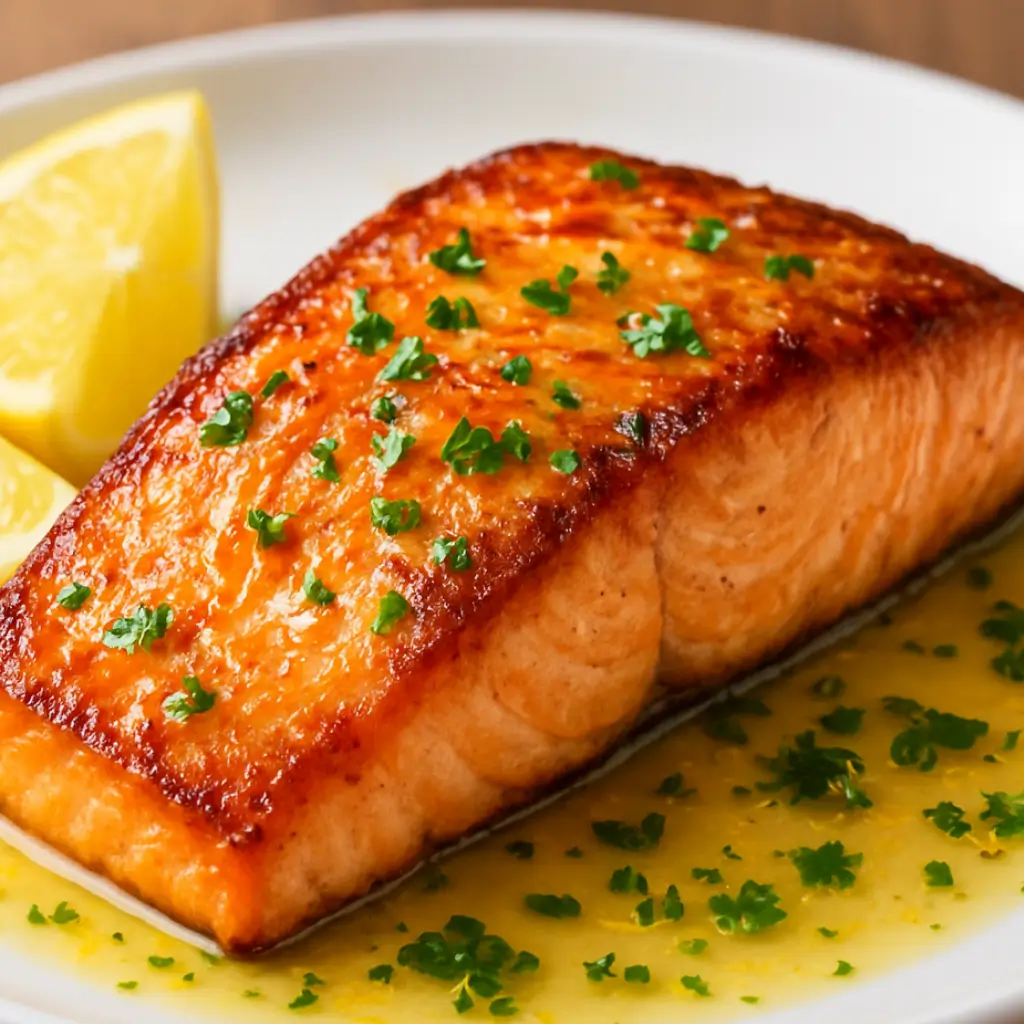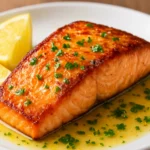Few dishes are as satisfying, quick, and universally loved as seared salmon. With its golden, crisp crust on the outside and tender, juicy interior, this dish brings restaurant-quality flavor to your home kitchen in just minutes. The best part? You don’t need complicated equipment or a long ingredient list.
Whether you’re cooking a healthy weeknight dinner, prepping high-protein meals, or looking to impress guests with something elegant yet effortless, pan-seared salmon is the answer. With only four main ingredients and a total cooking time of just 15 minutes, it’s one of the most efficient meals you can master.
In this ultimate guide, we’ll cover everything: the foolproof recipe, cooking times, nutrition, common mistakes, flavor variations, serving ideas, FAQs, and why salmon is such a nutritional powerhouse. By the end, you’ll have all the knowledge you need to consistently create the perfect seared salmon.
Quick Recipe Snapshot
Servings: 4
Prep Time: 5 Minutes
Cook Time: 10 Minutes
Total Time: 15 Minutes
Calories: 384 per serving
This quick overview provides the essential details, but keep reading for in-depth step-by-step instructions and expert tips.
Ingredients
Here’s everything you’ll need for the classic version of seared salmon:
- 1 tablespoon extra-virgin olive oil for crisping the salmon while keeping it light.
- ½ teaspoon kosher salt enhances the natural flavor of the fish.
- Freshly ground black pepper a touch of spice and balance.
- 4 salmon fillets (6 ounces each, 1¼ inches thick) skinless or skin-on, depending on your preference.
Tip: Ask your fishmonger to cut even-sized fillets so they cook uniformly.
Step-by-Step Instructions
Follow these steps to achieve flawless seared salmon every time:
- Prepare the salmon
Pat each fillet dry with paper towels. This step is essential for crisp browning. Season generously with kosher salt and a few twists of black pepper on both sides. - Heat the pan
Place a 12-inch nonstick skillet over medium-high heat. Add olive oil and let it heat until shimmering. A shimmering surface signals the oil is hot enough for a proper sear. - Start the sear
Place the salmon fillets in the skillet, skin side up if skin is present. Cook for about 4 minutes without moving them. This undisturbed contact creates the golden-brown crust that defines seared salmon. - Flip carefully
Using a thin spatula, gently flip the salmon fillets. Reduce the heat to medium to prevent the outside from burning while the inside finishes cooking. - Finish cooking
Continue cooking for 4 to 5 minutes more, depending on thickness, until the salmon flakes easily with a fork or reaches your preferred doneness. - Rest and serve
Transfer the salmon to a platter and let it rest for 1 to 2 minutes. Resting redistributes juices and keeps the fish moist. Serve hot.
Timing & Doneness Guide
Knowing how long to cook seared salmon depends on thickness and desired doneness. Use this guide as a quick reference:
| Fillet Thickness | Time (First Side) | Time (Second Side) | Internal Temp* | Result |
|---|---|---|---|---|
| 1¼ inch | 4 minutes | 4–5 minutes | 125–130°F | Medium: moist, slightly pink center |
| Thinner fillet | 3 minutes | 3–4 minutes | 120–125°F | Medium rare: very moist, translucent |
| Thicker fillet | 5 minutes | 5–6 minutes | 135°F+ | Medium well: more firm, fully opaque |
*Always check with a food thermometer if unsure. Salmon continues cooking slightly after being removed from the pan.
Nutrition Information
Here’s the nutrition breakdown per serving (based on 4 servings):
- Calories: 384
- Fat: 26 g
- Saturated fat: 6 g
- Carbohydrates: 0 g
- Fiber: 0 g
- Sugar: 0 g
- Protein: 35 g
- Sodium: 336 mg
- Cholesterol: 94 mg
This makes seared salmon an excellent choice for keto, low-carb, paleo, and high-protein diets.
Common Mistakes to Avoid
Even simple recipes can go wrong without the right technique. Avoid these pitfalls for consistently great results:
- Placing salmon in a cold pan Always preheat oil until shimmering.
- Moving the salmon too soon Let the crust form before flipping.
- Cooking on high heat the whole time After flipping, reduce to medium to prevent burning.
- Skipping the dry-off step Moisture prevents browning and causes sticking.
- Overcooking Salmon dries out quickly; remove when slightly underdone.
Flavor Variations & Add-Ons
The beauty of seared salmon is its versatility. Try these variations:
- Herb butter seared salmon Add butter, garlic, and fresh thyme or dill after flipping.
- Citrus salmon Finish with lemon juice, lime zest, or orange slices.
- Spicy garlic salmon Add minced garlic and a pinch of red pepper flakes for heat.
- Asian-inspired glaze Brush with soy sauce, ginger, and honey at the end for a sticky finish.
- Mediterranean twist Top with olives, capers, and cherry tomatoes.
Serving Suggestions
Seared salmon pairs beautifully with a wide range of sides and sauces:
- Vegetables: Roasted asparagus, sautéed spinach, or garlic green beans.
- Carbohydrates: Lemon rice, quinoa salad, mashed potatoes, or couscous.
- Sauces: Creamy dill, chimichurri, tzatziki, or lemon butter sauce.
- Salads: Fresh Greek salad, kale Caesar, or arugula with balsamic dressing.
Seared Salmon vs Other Cooking Methods
| Method | Flavor & Texture | Best Use |
|---|---|---|
| Seared | Crisp outside, juicy inside | Quick dinners, restaurant-style plating |
| Grilled | Smoky, charred edges | Summer BBQs, outdoor meals |
| Baked | Even cooking, gentle heat | Hands-off cooking, family dinners |
| Poached | Soft, delicate | Healthy, low-fat preparation |
| Broiled | Crispy top, tender inside | Oven alternative to searing |
Health Benefits of Salmon
Beyond taste, salmon is a nutritional powerhouse:
- Rich in omega-3 fatty acids Supports heart and brain health.
- High in protein Builds and repairs muscle, promotes satiety.
- Loaded with vitamins Especially vitamin D and B12.
- Minerals Good source of selenium, potassium, and phosphorus.
Conclusion
Seared salmon proves that cooking a nutritious, elegant dish doesn’t have to take hours or require dozens of ingredients. With just olive oil, salt, pepper, and high-quality salmon fillets, you can create a dish that’s crisp on the outside, juicy on the inside, and bursting with flavor all in just 15 minutes.
This recipe is endlessly versatile, pairs with countless sides, and works for both casual weeknights and dinner parties.
FAQ
Can I cook salmon with the skin on?
Yes. Skin helps hold the fish together and provides extra crispiness. If you prefer, you can remove it after cooking.
How do I know when salmon is done?
Salmon should flake easily with a fork and be slightly translucent in the center. Internal temp should reach 125–130°F for medium.
Can I use frozen salmon?
Absolutely. Thaw fully in the refrigerator overnight, then pat dry before cooking.
Should I use butter or oil?
Olive oil is great for high-heat searing. Butter adds richness but can burn; consider combining butter + oil or adding butter toward the end.
How do I prevent salmon from sticking?
Preheat the pan properly, pat the fish dry, and avoid moving it too soon.
Seared Salmon Recipe How to Cook in 15 Minutes
Materials
- 1 tablespoon extra-virgin olive oil
- ½ teaspoon kosher salt
- Freshly ground black pepper
- 4 6-ounce salmon fillets, 1¼ in thick (I have my fish monger remove the skin, but it’s fine to leave it on if you like)
Instructions
- Season the salmon with the salt and a few grinds of pepper. Heat the oil in a 12-inch nonstick skillet over medium-high heat until hot and shimmering.
- Cook the salmon, without moving, skin side up, until golden and crisp, about 4 minutes. Carefully flip the fillets and reduce the heat to medium.
- Continue cooking until done to your liking, 4 to 5 minutes more. Transfer to a platter and serve.
Notes
Follow us on Pinterest
For More recipes visite: Kifod.com


